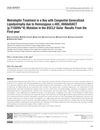 80 citations,
October 1985 in “American Journal of Public Health”
80 citations,
October 1985 in “American Journal of Public Health” A weight loss program with a special fast helped patients lose an average of 41-47 pounds and improved their health, but maintaining the weight loss was challenging.
 40 citations,
January 2010 in “Annales D Endocrinologie”
40 citations,
January 2010 in “Annales D Endocrinologie” The French Endocrine Society suggests diagnosing PCOS with two of three signs, recommends lifestyle changes and clomiphene for treatment, and calls for more research on certain treatments and tests.
 13 citations,
March 2019 in “Physiological Research”
13 citations,
March 2019 in “Physiological Research” Overweight women with PCOS have higher levels of certain hormones that could indicate a higher risk of heart and metabolic problems.
 May 2024 in “International Journal of Advanced Academic Studies”
May 2024 in “International Journal of Advanced Academic Studies” Vitamin E helps reduce PCOS symptoms and improves hormonal balance.

Older people tend to have higher biotin levels, which are weakly linked to certain blood components and negatively linked to triglycerides; biotin should be checked in patients with high triglycerides or medication-related skin issues, and only supplemented if deficient. Vitamin D and folate deficiencies are linked to specific skin conditions.
 December 2022 in “Türk biyokimya dergisi”
December 2022 in “Türk biyokimya dergisi” The conclusions are: fecal short-chain fatty acids may help prevent cancer, fiber intake can reduce obesity, weight loss is hard for obese people, low BMI cancer patients are more prone to chemotherapy side effects, intermittent fasting benefits gut health, cherry laurel has health benefits in rats, certain gene variations can increase stress in hair loss patients, fecal acids can affect blood sugar levels, cold agglutinin can affect blood test results in autoimmune patients, and people with Crohn's disease have higher levels of a certain chemical in their blood.
 June 2022 in “Journal of the Liaquat University of Medical and Health Sciences”
June 2022 in “Journal of the Liaquat University of Medical and Health Sciences” People with lichen planus are more likely to have abnormal blood fats than healthy people.
 97 citations,
October 2019 in “Journal of Translational Medicine”
97 citations,
October 2019 in “Journal of Translational Medicine” A very low-calorie ketogenic diet is effective for quick weight loss and improving health in obese patients, with careful management of side effects and maintenance.
 60 citations,
February 2010 in “Gynecological Endocrinology”
60 citations,
February 2010 in “Gynecological Endocrinology” Metformin combined with lifestyle changes improves insulin resistance and reduces testosterone levels in women with PCOS more than lifestyle changes alone.
 3 citations,
January 2019 in “Elsevier eBooks”
3 citations,
January 2019 in “Elsevier eBooks” Pharmacists should interpret lab data and perform physical exams to improve patient care.
 2 citations,
February 2021 in “Endocrinology, diabetes & metabolism case reports”
2 citations,
February 2021 in “Endocrinology, diabetes & metabolism case reports” A teenage girl had both a rare ovarian tumor and a severe form of polycystic ovarian syndrome.
 1 citations,
June 2022 in “JCRPE”
1 citations,
June 2022 in “JCRPE” Metreleptin treatment significantly improved metabolic health in a boy with congenital generalized lipodystrophy.
 January 2023 in “International journal of medical science and health research”
January 2023 in “International journal of medical science and health research” Anovulatory PCOS patients are younger with longer cycles and higher blood pressure and hormone levels.
 14 citations,
March 2016 in “Journal of Dermatology”
14 citations,
March 2016 in “Journal of Dermatology” Hair loss links to high blood pressure, high fat levels, and metabolic issues, suggesting early heart disease screening.
 1 citations,
December 2022 in “Gynecological Endocrinology”
1 citations,
December 2022 in “Gynecological Endocrinology” The most common skin issues in females with Polycystic Ovary Syndrome (PCOS) are excessive hair growth, hair loss, oily skin, acne, dark skin patches, and skin tags, which may be linked to hormone and insulin levels.
 November 2022 in “International Journal of General Medicine”
November 2022 in “International Journal of General Medicine” Women with Polycystic Ovary Syndrome are more likely to have Non-Alcoholic Fatty Pancreas Disease, which is associated with older age, metabolic syndrome, insulin resistance, and high male hormone levels.
 April 2018 in “The Journal of Urology”
April 2018 in “The Journal of Urology” Men with prediabetes have worse sexual health and a higher risk of severe erectile dysfunction.
December 2021 in “International Journal of Research in Dermatology” Men with early-onset hair loss have a higher risk of metabolic syndrome.
January 2021 in “Menoufia Medical Journal” Women with pattern hair loss often have higher blood sugar, cholesterol, blood pressure, and waist size, suggesting a link between hair loss and metabolic syndrome.
 February 2019 in “Journal of Pakistan Association of Dermatology”
February 2019 in “Journal of Pakistan Association of Dermatology” Many men with male pattern baldness have abnormal blood fat levels, which may raise their risk of heart disease.
 48 citations,
October 2014 in “International Journal of Cardiology”
48 citations,
October 2014 in “International Journal of Cardiology” People with alopecia are at higher risk for heart disease and have more heart-related risk factors.
 14 citations,
August 2019 in “BioMed Research International”
14 citations,
August 2019 in “BioMed Research International” Belly fat is the main predictor of nonalcoholic fatty liver disease in both women with Polycystic ovary syndrome and healthy women.
 6 citations,
December 2022 in “Frontiers in Pharmacology”
6 citations,
December 2022 in “Frontiers in Pharmacology” Quercetin may help improve symptoms of polycystic ovary syndrome.
5 citations,
February 2021 in “JCPSP. Journal of the College of Physicians & Surgeons Pakistan” Early-onset hair loss in young males is linked to a higher risk of metabolic syndrome.
 5 citations,
June 2018 in “Journal of Diabetes, Metabolic Disorders & Control”
5 citations,
June 2018 in “Journal of Diabetes, Metabolic Disorders & Control” Women with PCOS may have higher bad cholesterol and are at risk for blood sugar issues; lifestyle changes are recommended.
 2 citations,
February 2023 in “BMC endocrine disorders”
2 citations,
February 2023 in “BMC endocrine disorders” Curcumin improved some metabolic factors in women with PCOS but did not affect cholesterol, insulin, or testosterone levels.
 May 2022 in “Maǧallaẗ Buḥūṯ Al-Tarbiyyaẗ Al-Nawʿiyyaẗ (Print)”
May 2022 in “Maǧallaẗ Buḥūṯ Al-Tarbiyyaẗ Al-Nawʿiyyaẗ (Print)” Eating a high inositol diet significantly improves insulin resistance and hormone levels in women with PCOS.
October 2018 in “International Journal of Research in Dermatology” People with androgenetic alopecia are more likely to have metabolic syndrome.
 7 citations,
August 2019 in “Journal of Ovarian Research”
7 citations,
August 2019 in “Journal of Ovarian Research” Blood removal and birth control pills both helped with hormone levels in women with PCOS, but birth control was better for regular periods and blood removal had fewer side effects.
 3 citations,
May 2023 in “Biomedicines”
3 citations,
May 2023 in “Biomedicines” PCOS causes infertility mainly due to hormonal imbalances, insulin resistance, and chronic inflammation.

























